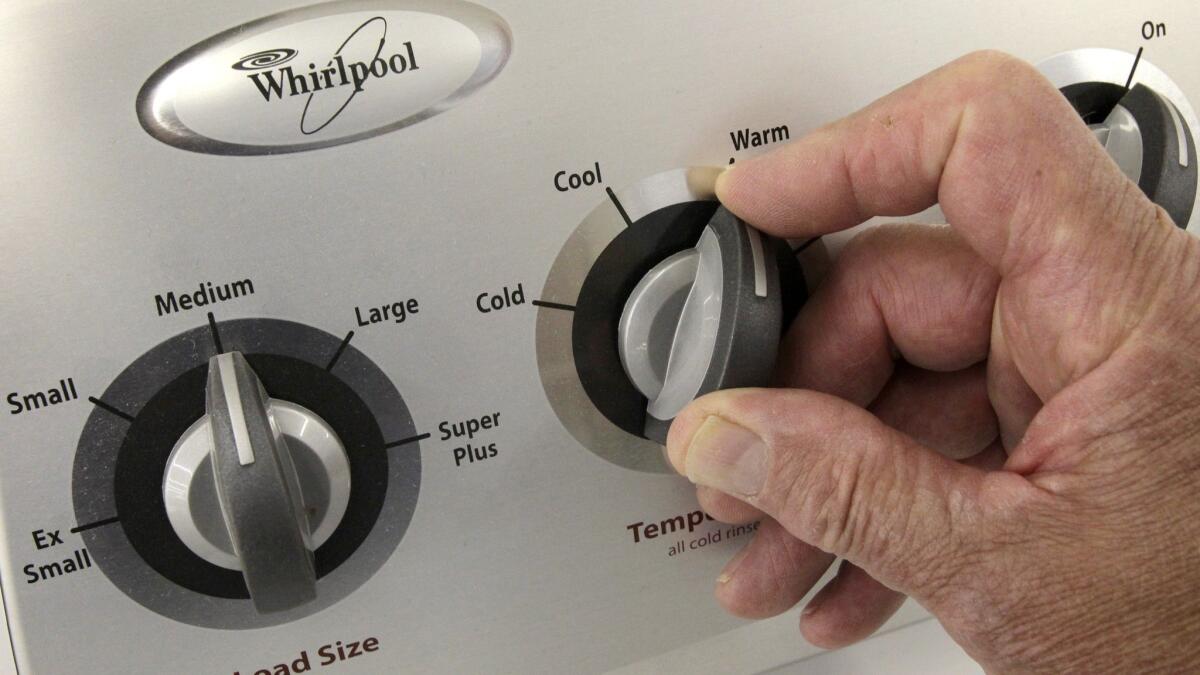The trade war is starting to show up in company earnings

- Share via
Last spring, companies warned that the Trump administration’s steel and aluminum tariffs could hit their bottom line. Now the bill is starting to come due.
Several big manufacturers and consumer goods companies have cited growing trade tensions as factors for their lower-than-expected financial results in the just-ended second quarter.
On Wednesday, General Motors Co. updated its full-year guidance and noted the “unfavorable impact of rising commodity costs,” saying the “recent and significant” price increases “negatively affected business expectations.”
GM said those higher commodity costs cut its earnings by $300 million in the second quarter compared with a year earlier. The company cut its earnings guidance for the year by $1 billion. GM’s stock price fell nearly 5% on Wednesday.
The same day, Ford Motor Co. executives said the second quarter was “challenging,” partly because of higher commodity costs and “tariff-related impacts.” The company reported revenue of $38.9 million, compared to $39.8 million during the same period a year ago.
A day earlier, appliance manufacturer Whirlpool Corp. said tariffs were a reason its results fell short of expectations. Excluding non-cash charges related to its overseas business, earnings fell to $3.20 a share from $3.35 a year earlier, and sales fell 4%, to $5.1 billion from $5.3 billion.
Whirlpool Chief Executive Marc Bitzer cited weaker-than-expected U.S. demand for its appliances and “headwinds related to U.S. tariffs” that helped drive up prices of steel and other raw materials costs. Whirlpool shares closed 3.7% lower.
“The tariffs affect companies in two ways,” said Larry Harris, professor of finance at USC’s Marshall School of Business. “It increases the cost of items that they buy from abroad that the U.S. government has now placed a tariff on. It also increases the cost to foreigners of the items they sell abroad. Both effects reduce [companies’] earnings.”
President Trump announced plans in March for a 10% duty on aluminum and a 25% tariff on steel imports from the European Union, Canada, China and Mexico. Several countries vowed to retaliate with their own tariffs.
Shortly after the Commerce Department urged Trump in February to consider the tariffs, the weekly price of steel and aluminum increased. The price increase, at least for aluminum, likely flowed to equipment manufacturers, such as Whirlpool, by late in the second quarter, said Doug Hilderhoff, principal analyst in aluminum at CRU.
Campbell Soup Co. warned financial analysts in May that its margins could take a hit in the year starting in August due to the anticipated import tariffs. An executive from the Camden, N.J., firm said on an earnings call then that the company expected to see “double-digit increases” on steel and aluminum, “all of it driven by the impact of anticipated tariffs.”
By late June, motorcycle maker Harley-Davidson Inc. said it would move some production out of the United States to avoid tariffs levied by the EU. On a Tuesday earnings call about the company’s second-quarter results, Chief Executive Matthew Levatich described that decision as “key” to “protect[ing] the marketplace and our customer value equation as well as our dealer business model.”
Company executives said at the time that they expect the cost of the tariffs this year to be $45 million to $50 million and, because of that, lowered their earnings guidance for this year.
“We are doing everything we can at the company to absorb on the costs that we can,” John Olin, Harley-Davidson’s chief financial officer, said on the call. “As we look forward, we can’t eat the whole $45 million to $50 million or can’t cover it in other parts of our business. And for that, we are bringing down our guidance.”
On Tuesday, Bitzer of Whirlpool said “uncertainty related to tariffs and global trade actions” led to increased costs for “certain strategic components,” as well as finished goods, imports and exports. While the tariffs had only a “limited impact” in the second quarter, he warned in an earnings call with analysts that there could be further effects in the future as suppliers are forced to pay the tariffs.
A Goldman Sachs report released last week on the potential effect of tariffs on earnings and returns from the S&P 500 found that industries that are heavily reliant on imports, such as petroleum and coal products, computer and electronic products, and transportation face the “greatest supply chain risk” from escalating trade tensions.
While tariffs could lower revenues, the report found that the duties posed a larger threat to profit margins of the S&P 500.
On Wednesday, UPS Chief Executive David Abney said the company has “seen no significant impact at this time” to the company’s international freight shipment business, though it is “closely monitoring” the trade environment.
“If this trade war continued or these actions continued, there would always be some exposure or risk to our business,” he said. “But that exposure is very much limited.”
Boeing Co., a huge user of aluminum in its airplanes, did not mention tariffs in its earnings call Wednesday. A company executive did note, though, that good trade relations between the United States and China — which have been levying duties against each other’s products tit-for-tat — were beneficial to the aerospace industry.
More to Read
Inside the business of entertainment
The Wide Shot brings you news, analysis and insights on everything from streaming wars to production — and what it all means for the future.
You may occasionally receive promotional content from the Los Angeles Times.












